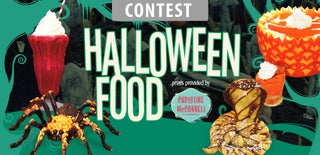Introduction: Soft Pretzel Witches' Fingers
Shudder you may to think of the ill deeds the previous owners of these fingers must have been up to. Hurry you should to grab one or two of the digits to nibble before they all disappear. Or you'd follow along this recipe to cook more for yourself alone.
INGREDIENTS
Red food coloring, a few drops
24 or more blanched almonds, split lengthwise
2 tbsp baking soda (or 1/4 cup baked baking soda, or 2 tbsp food-grade lye)
5-6 cups all purpose flour
2 cups warm water (110°F)
1 tbsp sugar
1 tsp coarse salt
1 tbsp active dry yeast
1 egg, beaten with 1 tbsp water for egg wash
Vegetable oil for brushing a large bowl or cooking spray
EQUIPMENT
Regular baking tools plus a spatula with drainage holes and a pair of chopsticks.
A stainless steel pot at least several inches tall is a must.
Note: This article may contain affiliate links as references for the same or similar products used in this project. If you click on the links and make purchases I could receive a small percentage of commission from the advertising company with no extra cost to you.
Step 1: Witch-ly Good Fingernails
You can skip this step. But for me it's a must. Witches' fingers should be witch-ly good.
Preheat your oven to 350°F.
Split almond lengthwise to look like "fingernails".
Place them in a singer layer on a baking sheet.
Bake them for 3 minutes or stand to watch until the almonds are slightly golden brown. They'll taste witch-ly good.
Place a few drops of red food coloring in a shallow bowl, using my finger tip (you can use a brush if you want), color the rounded side of each split almond to make "fingernails". Set them aside to dry.
Step 2: Proof Yeast
Any project uses yeast, it's important to know the yeast is alive before beginning.
Pour the warm water at 110°F (not hotter than 115°F) in a large mixing bowl.
Add sugar and stir to dissolve.
Sprinkle with yeast, and let it stand at least 5 minutes or until it begins to bubble, which means the yeast is active. No bubbles means the yeast isn't good and you need to use new yeast and start over by repeating the above steps.
Step 3: Make the Dough
Preheat oven to the lowest temperature, mine is 170°F, for next step.
Set aside 1 cup and place the remaining 5 cups in a large mixing bowl.
Add in the coarse salt.
Add in the yeast solution gradually and mix until well combined. If dough is sticky, add up to 1 cup the set aside flour, 1/4 cup at a time.
Turn out the dough onto a lightly floured surface, knead the dough until smooth.
Coat a large bowl with vegetable oil or cooking spray.
Transfer the dough to the coated bowl, turning the dough to coat it all over with oil not just the area in contact with the bowl (if you didn't do that, there would be a little problem in next step).
Cover the bowl with plastic wrap.
Step 4: Proof the Dough
Turn off the oven that has been preheated to the lowest temperature, mine is 170°F.
Place the covered bowl in the warm but off oven, let it rise until doubled in size, about 1 hour.
(If the dough wasn't turned to make it coated with oil in the previous step, the plastic wrap may stick to the top of the dough which may come in contact with the wrap after rising as shown in second photo in this step. It's not a big problem but a problem I bothered to solve).
Step 5: Form the Digits
Preheat oven to 450°F for use in next step.
Place a 6-quart saucepan of water on stove and turn on heat to bring it to a boil for use in next step.
Divide dough into quarters. Work with one quarter at a time, cover the remaining dough with plastic wrap.
Divide the first quarter into 12 pieces.
On a lightly floured surface, roll each piece back and forth with your palm into a long finger shape, 3-4 inches.
Pinch dough in two places to form knuckles.
Close to the end of this step, check on the water pot. If it's already boiling lower the heat, if far from boiling, turn up the heat.
When all 12 pieces are formed. It's time to dip them in simmering alkaline solution.
Step 6: Dip the Dough in Alkaline Solution: 3 Options
Lightly coat two large baking sheets with vegetable oil or cooking spray.
There are 3 kinds of solution I found people are using and I tried all of them.
Solution 1: Regular baking soda solution
When the 6-quarter saucepan of water is at boil, reduce it to a simmer.
Add baking soda.
Transfer the formed fingers into the simmering alkaline solution, one by one, several fingers at a time. Be careful to avoid splash. I used a pair of chopsticks and a long handle flat surface bent spatula with holes for drainage to do that.
Poach for 1 minute.
Transfer to a prepared baking sheet.
Repeat with remaining dough, poach each set of 12 fingers before making more, several fingers at a time.
If necessary, pinch each one in two places to form knuckles again.
Brush pretzel fingers with egg wash.
Use a sharp knife, lightly score each knuckle 3 times to make them realistically looking.
Push almond nails into one end of the finger sticks to attach.
Solution 2: Baked baking soda solution
This is my favorite solution among three. Baked baking soda solution not only gives a result that is close to the dark, burnished crust that lye imparts. It avoids to work with lye or spend time and money to source it. This step is ideally done before you start the project.
To bake the baking soda:
Preheat the oven to 250°F.
Spread out 1/4 cup/70g of baking soda on a glass pie pan or rimmed baking sheet covered with aluminum foil.
Bake it for 1 hour.
Allow it to cool completely.
Keep it in an airtight container at room temperature until you are ready to make pretzel.
Pour the baked baking soda in a tall stainless steel pot with 8 cups of water.
Bring it to a simmer over medium heat and use it as the dipping solution.
Solution 3: Lye solution
This solution gives a pretzel crust with deeply browned, lacquered mahogany appearance and a mineral flavor. But there are a few precautions to take. If you can't be absolutely sure you'll be able to avoid splashes, always wear rubber gloves to protect your forearms. Avoid touching dipped pretzels with bare hands until after they are baked. Wear protective eyewear to avoid steam irritates your eyes. With that said, food grade lye (sodium hydroxide, or NaOH) is not to fear.
To use lye solution:
Fill a deep pot with 6 cups of water.
Add lye, 1 tbsp at a time, total 2 tbsp.
With the hood vent on, warm the lye solution over high heat just until you see wisps of steam.
Remove the pot from the heat and cool the water until the steam subsides, about 5 minutes.
It's ready for dipping the fingers.
Step 7: Bake
Bake until golden brown, 12-15 minutes.
Let cool completely on a wire rack.
Here are 3 photos from second to fourth showing witches' fingers made of 3 dipping solutions of baking soda, baked baking soda, and lye.
Step 8: Enjoy
Fingers are best eaten the same day, but they can be stored in an airtight container up to 2 days at room teperature.
Bring them to a Halloween Party.
Individually wrap them and give out as treat so no trick.
Pack them as a lunch or sack treat.
Dip them in guacamole, delicious!
Dip them in balsamic base sauce, delicious!
Eat them with a soup.
Eat them just as they are.
Please consider voting this instructable for Halloween Food contest. Thanks a lot.

Participated in the
Halloween Food Contest 2016













